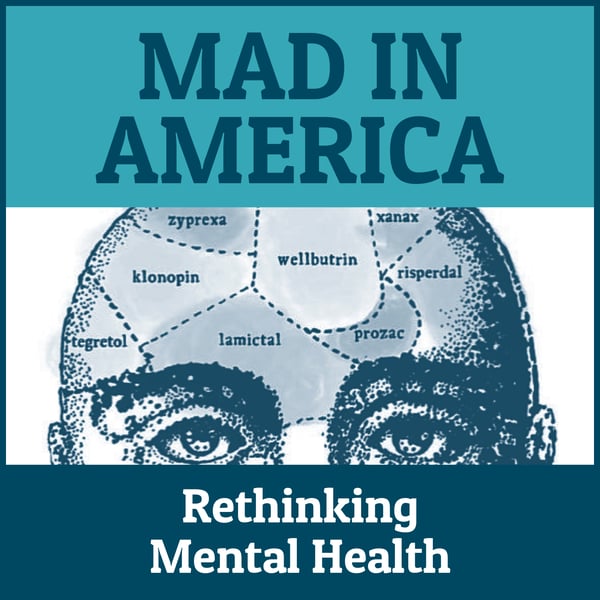Kermit Cole: Dialogical Therapy and Quantum Theory Walk Into a Bar…
Mad in America: Rethinking Mental Health
Mad in America
4.8 • 201 Ratings
🗓️ 7 May 2025
⏱️ 36 minutes
🧾️ Download transcript
Summary
Hello, my name is Bob Whitaker, and today I have the pleasure of speaking with Kermit Cole. We'll be speaking about a philosophical enterprise that Kermit is now deeply engaged in. That is, broadly speaking, how humor can help in creating a shared experience that is helpful to the healing process. Kermit, in his experiences of being with people in psychotic states, has seen humor as a moment when a connection can be made. In many ways, this project is bringing Kermit back full circle to his work as a film director, early in his professional career.
After dropping out of Oberlin College, he joined a mime troupe that toured the U.S. as well as Italy and Greece, inspired by his interest in humor as well as how connection arises in the spaces between words. One of his first films was a short titled Before Comedy, which is a film performed entirely without words. Another, which he directed in 1994 was titled Living Proof: HIV and the Pursuit of Happiness.
I met Kermit shortly after I published my book Mad in America in 2002. He was working at that time as a Residence Director of what might be called a halfway house in Cambridge called Wellmet. This was for people who had been discharged from or who were avoiding stays in psychiatric hospitals. The house was modeled to a degree after the Soteria Project.
Then in 2012 after I published Anatomy of an Epidemic, Kermit, Louisa Putnam and I transformed my blog site into a web magazine, also called Mad in America. Kermit was the founding editor of the site, and for the first few years, he was something of a one-man band, posting science reviews, blogs and personal stories at a feverish pace. After retiring from that position, he trained in open dialog therapy, and Louisa and Kermit practiced dialogically inspired therapy with clients in New Mexico. Both Louisa and Kermit are Mad in America Board Members.
***
A full transcript of this interview can be found here: https://www.madinamerica.com/2025/05/kermit-cole-dialogical-therapy-and-quantum-theory-walk-into-a-bar/
Thank you for being with us to listen to the podcast and read our articles this year. MIA is funded entirely by reader donations. If you value MIA, please help us continue to survive and grow. https://www.madinamerica.com/donate/
To find the Mad in America podcast on your preferred podcast player, click here: https://pod.link/1212789850
© Mad in America 2025. Produced by James Moore https://www.jmaudio.org
Transcript
Click on a timestamp to play from that location
| 0:00.0 | Welcome to the Madden America podcast, your source for science, psychiatry, and social justice. |
| 0:14.5 | Hello, my name is Bob Whitaker, and today I have the pleasure of speaking with Kermit Cole. |
| 0:19.6 | We'll be speaking about a philosophical |
| 0:21.5 | enterprise that Kermit is now deeply engaged in, and that is, broadly speaking, how humor can help |
| 0:27.3 | in creating a shared experience that is helpful to the healing process. Kermit, in his experiences of |
| 0:32.9 | being with people in psychotic states, has seen humor as a moment that a connection can be made. |
| 0:38.8 | In many ways, this project is bringing Kermit back full circle to his work as a film director |
| 0:43.2 | early in his professional career. After dropping out of Oberlin College, he joined a mime |
| 0:48.4 | troupe that toured the U.S., as well as Italy and Greece, inspired by his interest in humor as |
| 0:53.4 | how connection arises |
| 0:54.9 | in the spaces between words. One of his first films was a short titled Before Comedy, |
| 1:00.4 | which is a film performed entirely without words. Another, which he directed in 1994, was titled |
| 1:05.7 | Living Proof, HIV and the Pursuit of Happiness. Now I met Kermit shortly after I published Matt in America, |
| 1:12.3 | my book in 2002. He was working at that time as a residence director of what might be called |
| 1:17.3 | a halfway house in Cambridge, called WellMet, for people who had been discharged from, or who were |
| 1:22.4 | avoiding stays in psychiatric hospitals. The house was modeled to a degree after the Cisteria project. |
| 1:29.1 | Then in 2012, after I published anatomy of an epidemic, Kermit, Louisa Putnam, and I transformed |
| 1:34.5 | my personal blog site, Mad in America, into a web magazine. Kermit was the founding editor of the site, |
| 1:40.4 | and for the first few years was something of a one-man band posting science reviews, |
| 1:45.2 | blogs, and personal stories at a feverish pace. After retiring from that position, he trained |
| 1:50.3 | in open dialogue therapy and Louisa and Kermit practiced dialogically inspired therapy with |
| 1:54.8 | clients in New Mexico. Both Louisa and Kermit are Mad in America board members. Kermit, |
... |
Please login to see the full transcript.
Disclaimer: The podcast and artwork embedded on this page are from Mad in America, and are the property of its owner and not affiliated with or endorsed by Tapesearch.
Generated transcripts are the property of Mad in America and are distributed freely under the Fair Use doctrine. Transcripts generated by Tapesearch are not guaranteed to be accurate.
Copyright © Tapesearch 2025.

